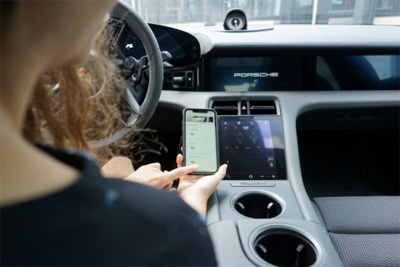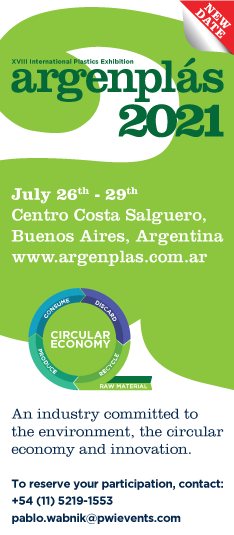| Plastics News |
Porsche and Circularise collaborate with Borealis, Covestro and Domo Chemicals to enable the traceability of plastics in the automotive sector
November 4, 2020 - Circularise, the blockchain supply chain transparency provider, as part of the Startup Autobahn innovation program, recently launched a project with Porsche and its material suppliers – Borealis, Covestro and Domo Chemicals – to enable the traceability of plastics on blockchain and to ensure that the use of sustainable materials in Porsche cars can be proven. By digitizing materials, Circularise says it was able to create a digital thread through the whole supply chain, enabling material traceability, tracking the CO2 footprint and other sustainability metrics like water savings. Getting information from supply chains has always been a challenge. Not only because of the inherent complexity of the supply chains and the multitude of suppliers, but also due to concerns around trust, privacy and confidentiality. Circularise says blockchain offers a fitting solution to transparency challenges in supply chains. “We believe transparency should not come at the cost of reduced privacy and confidentiality. That is why we developed our patent pending technology for creating verified statements on public blockchains without revealing any underlying sensitive data. While this raw data is very valuable in a B2B setting, consumers demand a more distilled and interactive version. We are proud to present exactly that in collaboration with Porsche and some of their pioneering suppliers,” says Mesbah Sabur. Porsche has a large number of suppliers providing parts to its cars but it doesn’t stop the company from looking for more information about the materials that go into its cars. According to Antoon Versteeg, Project Lead Innovation Research at Porsche, “We need to know more details on the parts and materials being used in our products, that means information on production processes deep down the supply chain, statements of recycled content and more. With the help of Circularise, as well as with the help of their partners we were able to trace for a number of specific cases plastics from raw material production to the final car.” A number of suppliers who can deliver sustainably produced materials for the automotive industry were involved in this project to realise the final outcome. Each batch of material was digitized on the blockchain receiving a digital copy called digital twin. The digital twin carries all relevant information regarding the batch, such as its environmental footprint and origin. This digital thread created transparency between project partners leading to an improved supply chain collaboration. Circularise says it also offers great advantages to the material manufacturers. According to Thomas Nuyts, Director of Global Product Management at Domo Chemicals, “as leader in the production of sustainable polyamides, we at Domo can only gain by making the supply chain more transparent. By tracking our materials, we will make a huge step ahead in supporting the automotive industry in its sustainability challenges. Besides providing recycled solutions from current sources we also aim to enlarge this loop and find new raw materials for our products to meet the mobility needs of today and tomorrow.” However, the companies cannot simply create a digital twin. First, the batch of materials needs to be audited by an independent third party to verify that the material and related claims are true. “Verification is essential. Even with a supply chain involving blockchains we want independent auditors for our system. And this is how we gain the trust and confidence of all our value chain members. Several years from now, after these systems are in place on a wider scale, things will have been standardized. For now, it’s still early days. Auditors and certifications are essential to ensure that no one can engage in greenwashing. But we really need to pick up the pace as we keep moving towards more circularity,” says Christopher McArdle, Borealis Vice President Polyolefin Strategy and New Business Development. Once the materials are digitized, the parties along the supply chain can now update the digital twin mimicking the physical supply chain and reflecting the manufacturing processes along the lifecycle of the product. Circularise says its “Smart Questioning” technology allow for this process to take place while preserving everyone’s privacy regarding their identity and business relations and protecting confidential information. Burkhard Zimmermann, Head of Resin, Digital Transformation & Sustainability at Covestro’s Polycarbonates segment: “For us, it is really important to share information and be more transparent while maintaining confidentiality. For instance, the material composition is of competitive advantage so we would never share that openly. Here, Circularise helps us to maintain this confidentiality and only disclose the information needed from raw material producer to recycler. And with that, we can close the loop.” Not only this approach helps car manufacturers to make better decisions for the next generations of vehicles and support end-of-life recycling approaches, but it also may help final consumers to learn more about their vehicle and its origins, enabling them to make more sustainable choices. Ultimately it reduces the environmental impact across the whole value chain, Circularise claims. Borealis is one of the world’s leading providers of polyolefin solutions and a European market leader in base chemicals, fertilizers and the mechanical recycling of plastics. With head offices in Vienna, Austria, Borealis employs 6,900 employees and operates in over 120 countries. In 2019, Borealis generated EUR 8.1 billion in sales revenue and a net profit of EUR 872 million. OMV, the Austria-based international oil and gas company, owns 75% of Borealis, while the remaining 25% is owned by a holding company of the Abu-Dhabi based Mubadala. Borealis supply services and products to customers around the globe through Borealis and two important joint ventures: Borouge (with the Abu Dhabi National Oil Company, or ADNOC, based in UAE); and Baystar (with Total, based in the US). Circularise was founded in 2016 and is based in The Netherlands. The company uses blockchain and other emerging technologies to enable companies share data about their products while retaining privacy over sensitive information. With 2019 sales of EUR 12.4 billion, Covestro is among the world’s largest polymer companies. Business activities are focused on the manufacture of polymer materials and the development of solutions for products used in many areas of daily life. The main segments served are the automotive, construction, wood processing and furniture, and electrical and electronics industries. Other sectors include sports and leisure, cosmetics, health and the chemical industry itself. Covestro has 30 production sites worldwide and employs approximately 17,200 people (calculated as full-time equivalents) at the end of 2019. DOMO Chemicals is a leading producer of engineering nylon materials for a diverse range of markets, including the automotive, food, medical, pharmaceutical, chemicals and electronics industries. The company offers a portfolio of integrated nylon 6 and 66 products, including intermediates, resins, engineering plastics, performance fibres, packaging film and distribution of petrochemical products. Headquartered in Germany, the family- owned company generated 2019 sales over EUR 900 million and employs in 2020 approximately 2200 employees worldwide. Porsche AG is a German automobile manufacturer specializing in high-performance sports cars, SUVs and sedans. The headquarters of Porsche AG is in Stuttgart, and the company is owned by Volkswagen AG, a controlling stake of which is owned by Porsche Automobil Holding SE. Source: Webwire |


